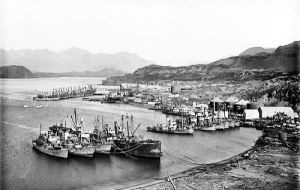MercoPress. South Atlantic News Agency
South Georgia’s whaling history to the prelude of the Falklands conflict (*)
 The Salvensen’s family Leith Harbour when the boom in whaling
The Salvensen’s family Leith Harbour when the boom in whaling On September 13th 1909, 100 years ago, the “SS Starlight” arrived at South Georgia with men and materials to erect a shore whaling station. Her destination was a cove in Stromness Bay which became known appropriately as Leith Harbour because the company building the station was Christian Salvesen's of Leith, on the outskirts of Edinburgh.
The site of Leith Harbour had been reconnoitred the previous year by Henrik Henriksen, who became the first manager. The station was built at the head of the cove, at a site known as Jericho, but after two avalanches and a rock-fall, which killed three men, much of the station was relocated to its present position, one kilometre southward. A second ship “Coronda” arrived on November 30th, incidentally bringing South Georgia's first magistrate James Innes Wilson, and the first whale was caught on December 10th by the whale-catcher “Semla”.
Henriksen was succeeded by Leganger Hansen in 1916. He remained until 1937, earning the unofficial title of 'King of South Georgia'. As well as making Leith Harbour pre-eminent among the Island's shore stations, he planned the operations of Salvesen's pelagic factory ships.
Salvesen's of Leith, as the name suggests, had its origins in Norway (until recently the company logo was based on the Norwegian flag). In 1851 Christian Salvesen settled in Scotland and established a successful company with shipping and other interests, including Arctic whaling. His son Theodore took the company to the South Atlantic, whaling first at New Island in the Falklands and then at Leith Harbour. Salvesen's later dominant place in the whaling industry was driven by Theodore's son Harold. He became a leader in the negotiations to restrict catches and preserve whale stocks and drove the technical developments that increased the efficiency of the whaling process. He also confronted a Norwegian union's attempts to reserve whaling jobs for its own nationals and, by the 1950s, half Salvesen's employees were British.
From the outset, Salvesen's were required by the terms of their lease with the government of the Falkland Islands Dependencies to utilise the whole whale, rather than wastefully strip the blubber and jettison the rest of the carcass as was the practice at Grytviken.
Leith Harbour survived the overproduction crisis of 1931, which forced some other land stations to close. This was due to the financial strength of Salvesen's. Operation was able to continue because of the station's technical efficiency and its use as a forward base for Salvesens' factory ships. Stromness whaling station was leased in 1931 and used for maintaining the company's whale-catchers.
By the end of the 1950s, Leith Harbour was utilising every part of the whale, including the baleen which was used in the manufacture of brushes. Nevertheless whaling was going into a steep decline through over-fishing of the whales. Salvesen's ceased operations at Leith Harbour in the 1961/2 season but the station was sub-leased to a Japanese company which operated until December 15th 1965.
This was the end of whaling at South Georgia but there is a postscript. Salvesen's bought the leases of all the whaling stations on the Island in the mid-1970s, on the off-chance that whaling or some other industry might become viable in the future.
In 1979, Constantino Davidoff of Buenos Aires contracted with Salvesen's to salvage machinery and other items from the abandoned whaling stations. The involvement of the Argentine navy in Davidoff's venture was a prelude to the invasion of South Georgia and the Falkland Islands in 1982.
(*) The article was posted in the South Georgia Newsletter, credited to Bob Burton




Top Comments
Disclaimer & comment rules-

Read all commentsMr Burton...why you tell only one part of the history??
Sep 21st, 2009 - 05:15 pm 0http://www.irizar.org/819puglisi-georgias.pdf
Commenting for this story is now closed.
If you have a Facebook account, become a fan and comment on our Facebook Page!